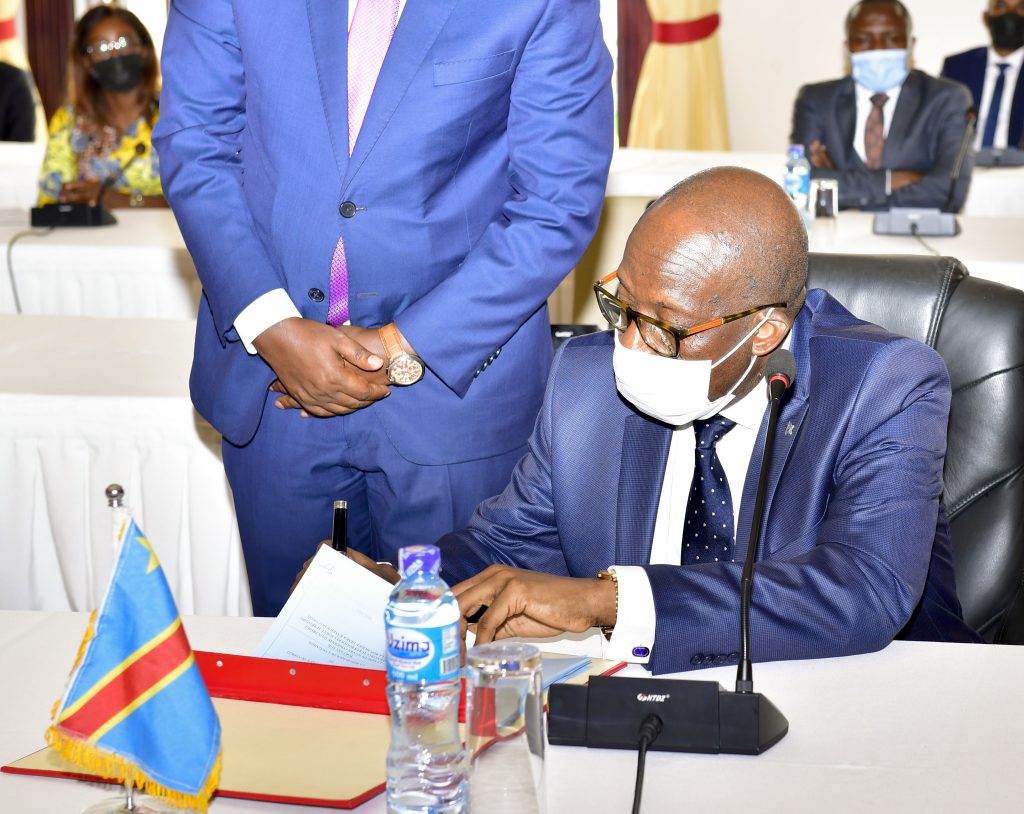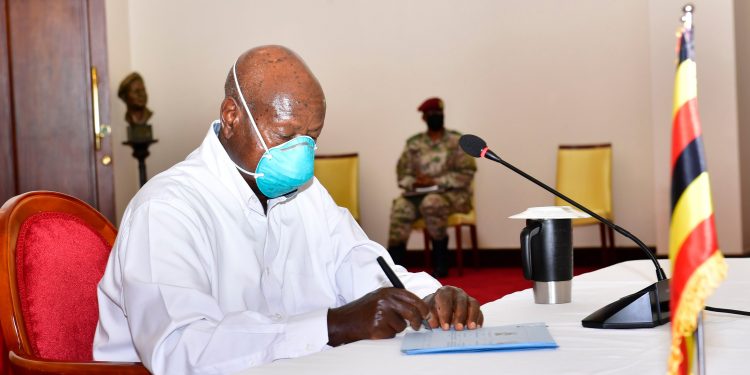Uganda and the Democratic Republic of Congo (DRC) have signed major agreements that will see the two countries bolster cross-border trade, development and the stabilization of eastern Congo.
The signing ceremony that was held yesterday Thursday at State House Entebbe, is a follow-up to the meeting between President Yoweri Museveni and President Felix Tshisekedi that recently took place at State House Entebbe when he was in the country to attend Museveni’s swearing-in ceremony at Kololo.
Museveni signed the inter-governmental agreement on behalf of Uganda while deputy Prime Minister and minister of Foreign Affairs Christophe Lutundula signed on behalf of the Democratic Republic of Congo.
The signing was witnessed by the new speaker of parliament Rt. Hon. Jacob Oulanyah. On the same occasion, a project development agreement (PDA) was signed between the two countries on cross-border roads. The permanent secretary ministry of Works and Transport Bageya Waiswa signed on behalf of Uganda while the DRC minister of state for Infrastructure and Public Works Alexi Gisaro Muvunyi signed on behalf of DRC.
This was witnessed by the new deputy speaker Anita Annet Among. The third PDA agreement was signed with the Dott Services contractors and witnessed by DRC’s presidential advisor Bisere Fortunate.
Speaking shortly after the signing ceremony, Museveni expressed gratitude to Tshisekedi and the DRC government for accepting to partner with the Uganda government in the three crucial sectors of roads, electricity and security that he said are the pillars of development to any nation.
“This is just butter on a bread roll. Peace is the bread and roads are the butter. It’s good that President Tshisekedi sent his team to do something about the roads. We are also ready for the electricity. We took power to Kasindi and now Beni and Butembo. We shall extend to Mahangi. We are ready to work on three things, security, roads and electricity. Even if we don’t do anything else, for now, people on both sides will be happy with these,” Museveni said.
Breaking with protocol, Museveni said a new government has not yet been appointed into place because they need parliament to first sit and vet the appointees that is why he had to sign the agreements witnessed by the speaker and deputy speaker. Former ministers including Sam Kutesa who was invited as MC, Gen. Katumba Wamala and former Attorney General William Byaruhanga were invited as guests.
“We have not constituted government now. There are only three people, the president, speaker and deputy speaker. There are no ministers. I will sign with the deputy prime minister,” he said.
Museveni said Uganda and DRC not only share borders but their people are the same.
“The Nandis in Congo, the Bakonjo, Banyoro, Bahema, Banyamboga, Bamba, Hutu, Lendu etc are the same people. When there is insecurity, we are affected directly. We currently have 4,000 Congolese refugees in Uganda camps and others in society with their relatives,” he said.
On his part, Christophe Lutundula who delivered a special message from Tshisekedi, said he trusts Museveni in the three areas of roads, electricity and security and believes that once implemented, the needs of the people will be met.
“His commitment to these projects is true and firm. We shall implement what is going to be signed today and we believe and are convinced that they will be appreciated and will be of great benefit to the people both current and future generations,” he said.
He added that Tshisekedi was happy with Museveni’s Pan-African stand that emphasizes Africans finding solutions for their problems.

Last month, DRC reopened a reparation case it filed against Uganda at the International Court of Justice (ICJ). Congo demanded $322 million for damages caused by its troops during the Congo invasion between 1997 and 2003.
This reparation is part of the $4.3 billion compensation that Congo is demanding from Uganda – nearly half of the $10 billion it demanded in 2005. The additional amount Congo is demanding is for the looting of its minerals, destroying the environment, adverse impact on the economy and legal costs. When added the figure totals to about $4.3 billion (about Shs 14 trillion).
The figure is a drop from the $10 billion that DRC had demanded from Uganda in 2005 when it won the case.











